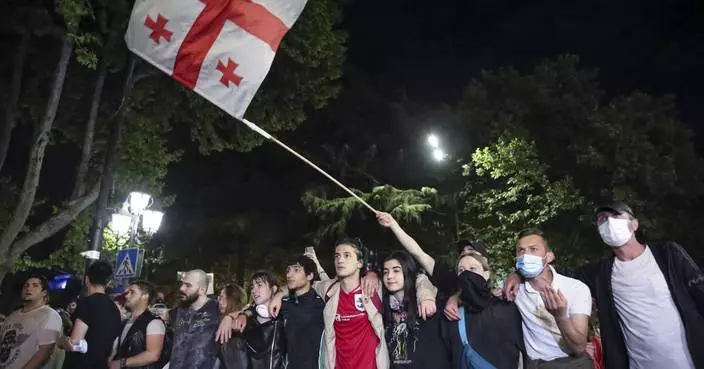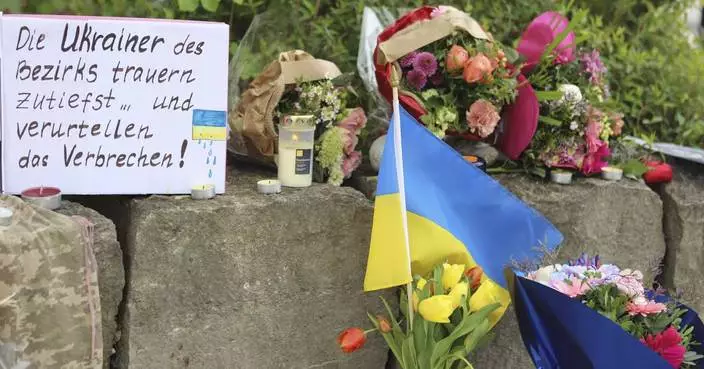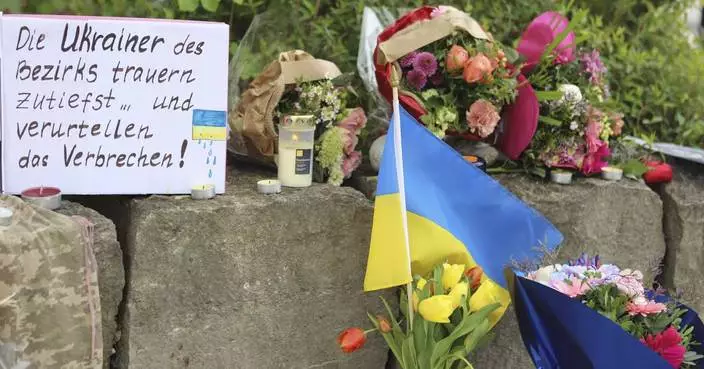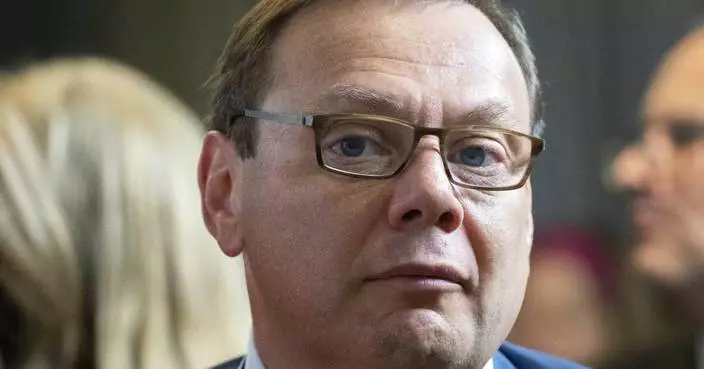Russian prosecutors are pushing to question U.S. intelligence agents and a former ambassador to Moscow in their investigation of an influential foe of Vladimir Putin.
The general prosecutor's office made the announcement Tuesday in the wake of Putin's summit Monday with U.S. President Donald Trump.
Putin offered to allow U.S. investigators to question Russian military agents accused of hacking the Democratic Party during the 2016 U.S. election campaign. In exchange, Russia wants to question U.S. officials suspected of involvement in alleged financial crimes by British investor Bill Browder.
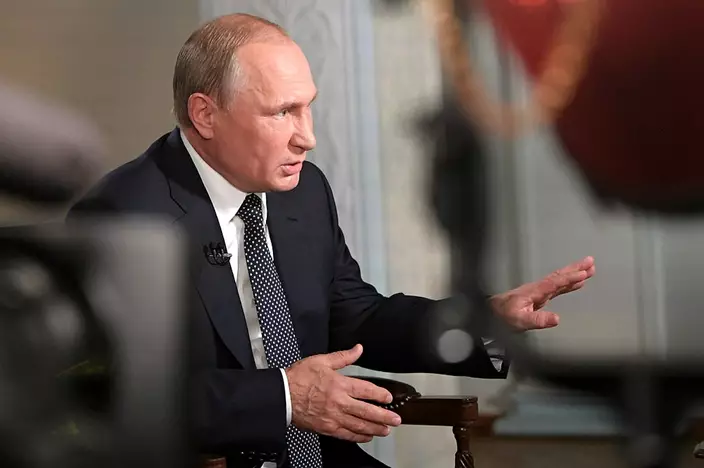
Russian President Vladimir Putin gestures during an interview with "Fox News Sunday" host Chris Wallace after his meeting with U.S. President Donald Trump in Helsinki, Finland, Monday, July 16, 2018. (Alexei Nikolsky, Sputnik, Kremlin Pool Photo via AP)
Representative Alexander Kurennoi told reporters the prosecutor's office is preparing requests to send to the U.S. for such interrogations.
Browder was behind a law on U.S. sanctions against powerful Russians that was prompted by the death of a Russian lawyer investigating corruption.
TBILISI, Georgia (AP) — Georgia has been engulfed by huge protests triggered by a proposed law that critics see as a threat to media freedom and the country’s aspirations to join the European Union.
Here is a look at the bill and the protests it has ignited:
The bill would require media and nongovernmental organizations and other nonprofits to register as “pursuing the interests of a foreign power” if they receive more than 20% of funding from abroad.
The legislature approved a second reading of the bill Wednesday, and the third and final reading is expected later this month.
The proposed legislation is nearly identical to the one that the governing Georgian Dream party was pressured to withdraw last year after street protests.
The governing party says the bill is necessary to stem what it deems as harmful foreign influence over the country’s political scene and to prevent unidentified foreign actors from trying to destabilize the country’s political scene.
The opposition denounces the bill as “the Russian law” because Moscow uses similar legislation to stigmatize independent news media and organizations critical of the Kremlin. Opponents of the bill say the fact that it is now before parliament is a sign of Moscow’s purported influence over Georgia. They fear it will become an impediment to the country’s long-sought prospects of joining the European Union.
Georgian President Salome Zourabichvili, who is increasingly at odds with the governing party, has vowed to veto the law, but Georgian Dream has a majority sufficient to override a presidential veto.
Russia-Georgia relations have been strained and turbulent since the 1991 collapse of the Soviet Union.
In August 2008, Russia fought a brief war with Georgia, which had made a botched attempt to regain control over the breakaway province of South Ossetia. Moscow then recognized South Ossetia and another separatist province, Abkhazia, as independent states and beefed up its military presence there. Most of the world considers both breakaway regions to be parts of Georgia, a former Soviet republic.
Tbilisi has ruptured diplomatic ties with Moscow, and the separatist regions’ status remains a key irritant, even as Russia-Georgia relations have improved in recent years.
The opposition United National Movement accuses Georgian Dream, which was founded by Bidzina Ivanishvili, a billionaire who made his fortune in Russia, of serving Moscow’s interests — an accusation the governing party vehemently denies.
For several successive days, thousands of demonstrators besieged the parliament building in a bid to block the bill’s passage and scuffled with police.
Police used tear gas and water cannons to disperse the crowds. Over 60 protesters have been arrested and several people have been injured. Levan Khabeishvili, chairman of the United National Movement, was among those injured.
On Thursday, parliament canceled its scheduled session, saying the move was because of damage to the building during Wednesday’s protests.
Another demonstration by thousands of people took place on Friday night, including a march to protest outside Georgian Dream's headquarters, but there were no reports of clashes.
EU foreign policy chief Josep Borrell has described the parliament’s move as “a very concerning development” and warned that “final adoption of this legislation would negatively impact Georgia’s progress on its EU path.”
“This law is not in line with EU core norms and values,” Borrell said in a statement last month. “The proposed legislation would limit the capacity of civil society and media organizations to operate freely, could limit freedom of expression and unfairly stigmatize organizations that deliver benefits to the citizens of Georgia.”

A demonstrator gestures standing between opposition protesters who gather to protest against "the Russian law" in Tbilisi, Georgia, on Tuesday, April 30, 2024. Clashes erupted between police and opposition demonstrators protesting a new bill intended to track foreign influence that the opposition denounced as Russia-inspired. (AP Photo/Zurab Tsertsvadze)

Riot police use a water cannon during an opposition protest against "the Russian law" near the Parliament building in Tbilisi, Georgia, Tuesday night, April 30, 2024. Clashes erupted between police and opposition demonstrators protesting a new bill intended to track foreign influence that the opposition denounced as Russia-inspired. (AP Photo/Zurab Tsertsvadze)

EDS NOTE: OBSCENITY - A demonstrator gestures trying as riot police use a water cannon during an opposition protest against "the Russian law" near the Parliament building in Tbilisi, Georgia, Tuesday night, April 30, 2024. Clashes erupted between police and opposition demonstrators protesting a new bill intended to track foreign influence that the opposition denounced as Russia-inspired. (AP Photo/Zurab Tsertsvadze)

Police use water cannons and tear gas against demonstrators during an opposition protest against "the Russian law" near the Parliament building in Tbilisi, Georgia, on Wednesday, May 1, 2024. Protesters denounce the bill as "the Russian law" because Moscow uses similar legislation to stigmatize independent news media and organizations critical of the Kremlin. (AP Photo/Zurab Tsertsvadze)

Police face demonstrators during an opposition protest against "the Russian law" near the Parliament building in Tbilisi, Georgia, on Wednesday, May 1, 2024. Protesters denounce the bill as "the Russian law" because Moscow uses similar legislation to stigmatize independent news media and organizations critical of the Kremlin. (AP Photo/Zurab Tsertsvadze)

A demonstrator gestures while arguing with the police during an opposition protest against "the Russian law" near the Parliament building in Tbilisi, Georgia, on Wednesday, May 1, 2024. Protesters denounce the bill as "the Russian law" because Moscow uses similar legislation to stigmatize independent news media and organizations critical of the Kremlin. (AP Photo/Zurab Tsertsvadze)

Demonstrators wave Georgian national flag during an opposition protest against "the Russian law" near the Parliament building in Tbilisi, Georgia, on Wednesday, May 1, 2024. Protesters denounce the bill as "the Russian law" because Moscow uses similar legislation to stigmatize independent news media and organizations critical of the Kremlin. (AP Photo/Zurab Tsertsvadze)

A woman shows a heart standing in front of riot police during an opposition protest against "the Russian law" near the Parliament building in Tbilisi, Georgia, on Wednesday, May 1, 2024. Clashes erupted between police and opposition demonstrators protesting a new bill intended to track foreign influence that the opposition denounced as Russia-inspired. (AP Photo/Zurab Tsertsvadze)

Demonstrators scuffle with riot police during an opposition protest against "the Russian law" near the Parliament building in Tbilisi, Georgia, on Wednesday, May 1, 2024. Clashes erupted between police and opposition demonstrators protesting a new bill intended to track foreign influence that the opposition denounced as Russia-inspired. (AP Photo/Zurab Tsertsvadze)

A couple embrace during an opposition protest against "the Russian law" near the Parliament building in Tbilisi, Georgia, on Wednesday, May 1, 2024. Clashes erupted between police and opposition demonstrators protesting a new bill intended to track foreign influence that the opposition denounced as Russia-inspired. (AP Photo/Zurab Tsertsvadze)

Demonstrators sit in front of police line during an opposition protest against "the Russian law" near the Parliament building in Tbilisi, Georgia, on Tuesday, April 30, 2024. Clashes erupted between police and opposition demonstrators protesting a new bill intended to track foreign influence that the opposition denounced as Russia-inspired. (AP Photo/Zurab Tsertsvadze)

Riot police use a water cannon during an opposition protest against "the Russian law" near the Parliament building in Tbilisi, Georgia, on Wednesday, May 1, 2024. Clashes erupted between police and opposition demonstrators protesting a new bill intended to track foreign influence that the opposition denounced as Russia-inspired. (AP Photo/Zurab Tsertsvadze)
















